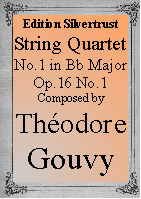Presents
Théodore Gouvy
 |
 |
- Soundbites courtesy of Steve Jones |
String Quartet No.1 in B flat Major, Op.16 No.1
Théodore Gouvy (1819-1898) was born into a French speaking family in the Alsatian village of Goffontaine which at the time belonged to Prussia. As a child, he showed no significant talent for music and after a normal preparatory education was sent to Paris in 1836 to study law. While there, he also continued piano lessons and became friendly with Adolphe Adam. This led to further music studies in Paris and Berlin. Gouvy, drawn toward pure instrumental music as opposed to opera, set himself the unenviable task of becoming a French symphonist. It was unenviable because the French, and especially the Parisians, throughout most of the 19th century were opera-mad and not particularly interested in pure instrumental music. It was this distain for instrumental music in general which led to Gouvy living the last third of his life almost entirely in Germany where he was much appreciated. During his lifetime, his compositions, and especially his chamber music, were held in high regard and often performed in those countries (Germany, Austria, England, Scandinavia & Russia) where chamber music mattered. But in France, he never achieved real acclaim. Gouvy was universally acknowledged for being a master of form and for his deft sense of instrumental timbre. Mendelssohn and Schumann were his models and his music developed along the lines one might have expected of those men had they lived longer. Virtually all of his works show that he was a gifted melodist whose music is a joy to hear.
That he and his music were held in high regard but nonetheless failed to achieve great fame is surely in part due to the fact that he was a man of some means who was not forced to earn his living from music. There has always been a bias against those who had the freedom to live for their art but did not need to live by it. Many jealous second-raters held this against him; the most notable being Fetis, a third rate composer who was nonetheless perhaps the most influential 19th century music critic. By contrast, musicians of the first rank such as Brahms, Reinecke and Joachim, who were familiar with Gouvy's music, held it in high regard.
Gouvy’s First String Quartet was published in 1857 but composed a few years before this. It is the first of a set of two. The esteemed chamber music expert Wilhelm Altmann, writing in his Handbook for String Quartet Players describes the work as follows:
"Gouvy's First Quartet is composed shows true quartet technique in the writing and builds on the style of Mozart and early Beethoven. In the first movement, Allegro, one finds unexpected and pleasing ideas which he puts to good use but never to exhaustion. The second movement, a bracing Allegretto is in the style of a serenade. This is followed by a charming, muted Larghetto. The finale, Presto, is dominated by great forward motion in all of the voices which ultimately builds to a powerful conclusion."
We have reprinted the first and only edition which is not up to modern standards but still quite serviceable for performance. The price, less than our generally very low prices, reflects this fact.
Parts: $21.95